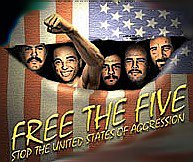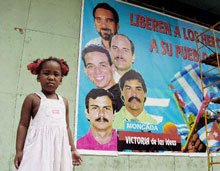By Circles Robinson
April, 2005One of the best-kept media secrets about Cuba is that the country holds regularly scheduled elections and that the Communist Party has nothing to do with the candidate selection.
In fact, the Caribbean island is about to hold nationwide nonpartisan municipal elections on Sunday, April 17. Voter registration is automatic for all citizens reaching sixteen years of age, unlike many countries where getting on the voter lists can be a difficult process for some sectors of the population.
Another surprise to those unfamiliar with the Cuban electoral system is that money is not the driving force, a refreshing difference from the dance of dollars and unethical practices that characterize campaigns throughout a continent where winning public office can be highly profitable.
Cuba does not claim to have a perfect electoral system but defends it as being more voter-friendly than others. As in most countries, the electoral law is subject to constitutional amendments, like occurred in 1992, when it was decided that provincial delegates and national parliament members should be elected by voters just like local representatives.
Those standing for election on the island are neither nominated because of their personal wealth nor for being the best fundraisers. Neither do they end up on corporate boards after leaving office as a payback for bending to special interest groups. The concept of a paid politician is absent in Cuba and even the national parliament representatives derive no financial compensation for their civic work.
Back in the 19th century, Cuban national hero Jose Marti was quoted as saying: "La Patria es ara, no pedestal" --the homeland is an altar, not a pedestal. His statement symbolizes the model for public service on the island since the 1959 revolution.
Anyone Can Nominate, Anyone Can be Nominated
Candidates in each of the 15,097 electoral districts located in the 169 municipalities were chosen at open neighborhood assemblies. All members of the electorate have the right to nominate a candidate or be picked to run for office, a unique feature of the Cuban system.
The electoral law stipulates that in each voting district there must be a minimum of two and a maximum of eight candidates. City council members serve two and a half year terms while provincial delegates and national parliament representatives are elected every five years.
As in the nonpartisan city council elections held in the vast majority of US municipalities and cities – like Los Angeles, Boston, Cleveland, Houston, Seattle, Las Vegas, Chicago and Atlanta – Cuban candidates do not have to have a party affiliation to seek public office. Instead, they run on their personal merits and include people with professional, political, community, religious and labor involvements.
The Communist Party sees its role in the electoral process as a promoter of citizen participation and community awareness. The political organization, which is considered the ideological backbone of the revolution, considers grassroots support crucial to the survival of the system.
Similar to Republican and Democratic Party members running in municipal elections in the US, the nonpartisan nature of the elections in Cuba does not exclude members of the Communist Party, but they must run as individuals.
High Voter Turnout
Since the current Cuban electoral system took effect in 1976, voter turnout has averaged 95% and above, one of the world’s highest for non-obligatory voting. This contrasts to municipal elections in the United States, which often draw less than a third of the registered voters.
An excellent example is the city council elections recently held in Los Angeles, California. With several candidates vying for mayor, only 28 percent of the registered voters bothered to show up at the polls. The two leading candidates, incumbent James Hahn and challenger Antonio Villaraigosa -who will compete in a runoff election-, received the nod from only 8 and 6 percent of the registered voters. Despite the spending of millions of dollars on the campaign, the vast majority of the electorate didn’t think any candidate was worth voting for.
Such a common situation in today’s USA would send up smoke signals in Cuba. National Assembly President Ricardo Alarcon said in a recent interview, “…the primary emphasis [in the Cuban electoral system] is on the participation of the people. I would be very concerned if the level of involvement declined, if the public were to grow indifferent toward their government.”
In the Bohemia magazine article about Cuba and the history of democracy quoted by a Canadian friends of Cuba group , Alarcon said, “…to resolve the basic problems of equality and build a system which allows participation to be channeled is easier said then done.”
An article published March 14 in Granma newspaper, the official organ of the Cuban Communist Party, takes a look at the long road ahead for men and women to have a truly equal opportunity to hold public office. The author, Maria Julia Mayoral, notes that while women now represent 23.37 percent of the local representatives, up from 8 percent in 1976, there are still major roadblocks to overcome.
Females now represent nearly two thirds of the island’s university graduates and also stand out in scientific research and community work. Nonetheless, Mayoral states, independent of their academic level and professional success, women continue to be tied to domestic obligations and family responsibilities that men conveniently believe are not theirs.
Foreign Media Blackout
Something that usually catches the eye of visitors at election time is how cities and towns in Cuba are not plastered with campaign propaganda and that local TV and radio programs are not bombarded with ads. Instead, candidate photos and biographies are publicly posted in the voting districts, where, do to their reduced size, the contenders are personally known by most voters. This year, meet the candidate evenings are also slated for the first two weeks of April.
Cuban elections may never be headline grabbers in the foreign media. The absence of fantastic promises and viscous negative media campaigns makes them rather dull by comparison. The large number of polling stations and always holding elections on a Sunday also mean virtually nobody ends up saying they didn’t vote because they didn’t have time, a common complaint lodged by a growing number of US citizens.
To the contrary, Iraq’s elections in January inundated world headline news because it was essential for the United States to show the world that its brand of democracy had arrived to the war torn Persian Gulf nation. After all, the alleged reason for being there in the first place—weapons of mass destruction—had long since proven to be a fabrication. The millions that boycotted the elections in protest of the foreign occupation of their country did so, according to Washington, because of their terrorist and undemocratic sympathies. On the other hand, the White House conveniently writes off Cuba’s elections and the high voter turnouts as “one-party” or “communist.”
Local Government in Cuba
Municipal governments, called People’s Power Assemblies, have a president and vice president similar to a mayor and vice-mayor. The number of electoral districts in the municipality determines the amount of city council members, known as delegates or representatives. The minimum number is 30 and some assemblies in the more densely populated areas have as many as 80, 100 or more members. A rural voting district may have as few as 300 constituents while that figure can reach 4,000 in densely populated urban areas. These are much smaller than most wards or districts in the United States.
Cuban city council members are empowered to elect the mayor and vice-mayor from within their ranks and must do so by secret ballot within 21 days after the elections.
The Cuban system puts great importance on citizen accessibility to their council people, thus explaining the smaller electoral districts and greater number of representatives than in local governments in the United States. In Cleveland, Ohio, for instance, the ratio is 24,000 residents to one city council representative and the rate is considerably higher in other urban populations.
Among the city council member’s responsibilities is to receive complaints and suggestions about public services and social problems, and vote on a proposed municipal budget which then goes on to the Provincial and National Assemblies for review and final approval. Then, it’s one of their jobs to see that the corresponding institutions implement budgeted projects.
In a country subjugated to nearly a half-century of economic, financial and commercial blockade from the world’s greatest military and economic power, the limitations faced by Cuba make the work of the city council member far from easy. Many of the economic problems facing the country originate in the White House, or the country’s colonial and dependent past, and some will continue as long as Washington insists.
However, creative efforts to resolve local problems with the limited resources at hand and making sure the municipality gets its fair share of support from the country’s many social programs, are the key to being a successful representative. Election officials note that on an average 46.5 percent of the delegates are re-elected, some for multiple terms.
Open to All
For visitors to Cuba interested in seeing the island’s electoral process in action, voter registration lists and candidate profiles are currently posted in convenient locations. In addition, the polling places on Election Day and the vote count are all open public activities.
A novel feature of Cuban elections is the presence of 5th to 9th grade students at the polling places. Besides getting acquainted with this important civic responsibility and symbolically guarding the ballot boxes, their function is to help voters with disabilities that request assistance.
On Election Day the polls will be open from 7am until 6pm, however anyone still in line at the scheduled time of closure is allowed to cast their ballot. The manual vote count is done in public immediately following the closing of the polls. To win, a candidate must obtain more than a 50% majority of the valid votes. In districts where no candidate obtains that amount, a runoff election will be held on April 24 between the top two contenders.

 Cuba insists that a new trial outside Miami, as originally ordered by the 11th Circuit Court of Appeals of Atlanta, would open a Pandora's Box for US law enforcement and intelligence agencies which have brazenly provided training, financed and encouraged terrorist acts against neighboring Cuba because the island refuses to give up its sovereignty.
Cuba insists that a new trial outside Miami, as originally ordered by the 11th Circuit Court of Appeals of Atlanta, would open a Pandora's Box for US law enforcement and intelligence agencies which have brazenly provided training, financed and encouraged terrorist acts against neighboring Cuba because the island refuses to give up its sovereignty.